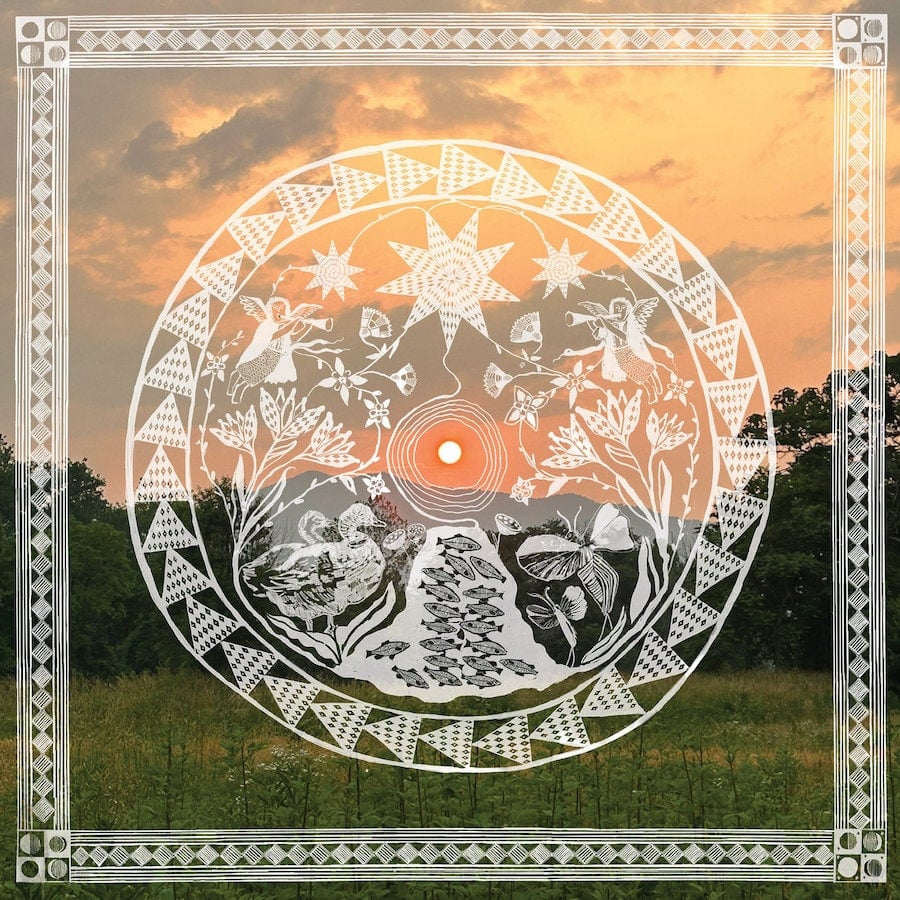Looking back over his last few albums, it’s fair to say that Virginia guitarist Daniel Bachman has been on an incredibly creative inner journey. As Glenn Kimpton observed in his opening review of Almanac Behind, his most recent trio of albums saw him shift from solo acoustic instrumental guitar whiz to something of an installation artist, pairing his fine guitar playing and acoustic drones with radio recordings and collected sounds. If…Axacan was a more focused record than The Morning Star, then Almanac Behind (a pertinent anagram of Daniel’s name) hones his new sound significantly more into a lean and precise tapestry.
For his newly announced album When the Roses Come Again, out November 17th on Three Lobed Recordings, Daniel exits the steel string world where he started and tiptoes into a new one, where apparitions and nature inhabit compositions in a musical, genealogical garden.
Anyone familiar with the Beat Generation writer William Burroughs will be aware of his surrealist cut-up technique – cutting up sections of text to rearrange and make something new. Similar collage methods have been used in music – David Bowie referred to it as a kind of “Western Tarot”, and Ben Chasny applied his Hexadic system using a deck of cards to the acoustic guitar to provide inspiration and to create something new.
Daniel shared the following about the technique he used when introducing the album’s lead single, Summer’s Fingers Sweetly Linger (Everywhere On Everyside):
“Like much of the record, this track features a cut-and-paste music-making style that I’ve really come to enjoy lately. The banjo melody that is woven over top of the fiddle and drum machine drone was assembled using hundreds of individual pieces of fretless banjo improvisations, where I cut each note, or series of notes out, and then rearranged, augmented, etc., until I found a new piece that I liked.
“The banjo is a cheap aluminium pot “Hondo” banjo that I got off eBay and then pulled all the frets from, giving it that fluid feel that floats right on top of the rhythm track. The song’s title, “Summer’s Fingers Sweetly Linger (Everywhere On Everyside)”, like all the tracks on the record, comes from a traditional tune titled “When the Roses Come Again”, which was played by the Carter Family and many more.
“While this record doesn’t sound much like traditional music from the early part of the 20 century, I used all stringband instruments to assemble it, even if they were heavily processed at times, and I personally think of “When The Roses Come Again” as my attempt at making a stringband record, playing the cycles of the seasons, their birth, death, and rebirth, from sunrise to sunset each day, and through every year here on Earth.”
Just as Burrough’s was able to alter our sense of reality, Daniel’s music is like a vortex into his own past, shaped by time, memory and ghosts…
Three Lobed reveal:
Bachman dug into the dirt of his own musical DNA. On his mother’s side of the family, who lived in the Laurel Highlands of the Alleghany Mountains, were his literal musical descendants, the Hostetler Blind Family Band. A mid-19th century string band, all born blind (including some born without eyes), the Hostetlers performed both original and traditional music on concertina, violins, cello, and dried corncobs for percussion. Bachman doesn’t try to replicate his ancestral past; he does breathe contemporary life into it through its inspiration, using oscillators and drum apps on his phone, as well as fiddle, banjo, and guitar to construct his own string band compositions. All the music was performed, arranged, and mixed entirely by Bachman, except for some of the handbells and harmonium samples played by Tyler Magill (Grand Banks/Carry).
Integrating technology as a tool for collage, as well as acoustic instruments that pre-date all of us, Bachman creates an album that has as much to do with Terry Riley, Laraaji, Eno’s late 70’s ambient albums, and 75 Dollar Bill as it does the Carter Family, Stanley Brothers, and Hobart Smith. And though this music has an undeniable intensity at times, it grounds the listener in an otherworldly mosaic of memory and experience. “My intention with this record was to represent the spiritual machinery that moves through all life, samsara, the wheel of life, etc. starting with birth, then death, and ending in rebirth,” writes Bachman. “I see this process moving in our garden through the seasons, and through intense personal experiences I’ve had. I see it in the churning of centuries within my own family, and through exploring these intergenerational connections I hope to better understand my own place within these intangible cycles.”
This cycle of life is indicated not just by the textures and sounds of the music but by the compositions’ titles, which originate from the Carter Family’s lyrics to “When the Roses Come Again”, itself a song about life after death. The music remains light and cyclical, re-born as it reverently sings and hums. When the Roses Come Again is an album of not just musical leitmotifs but re-occurring personal and natural histories that bloom long after their perennial promise is deceased.

Pre-Order via Bandcamp (Ltd Edition Black or Red Vinyl, CD and Digital) – https://threelobed.bandcamp.com/album/when-the-roses-come-again
